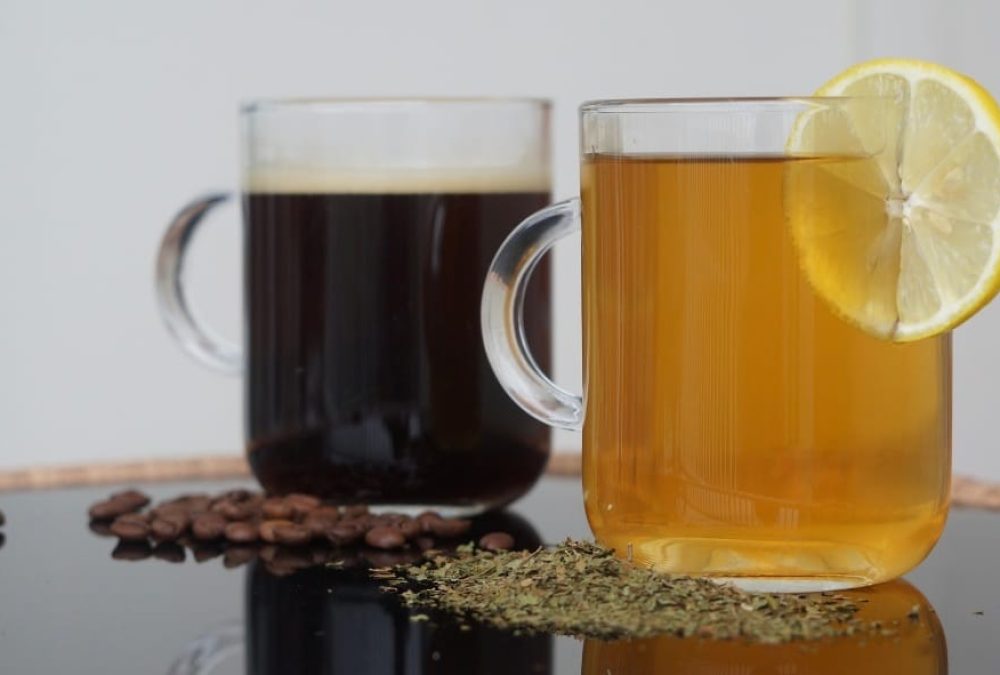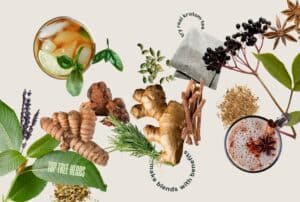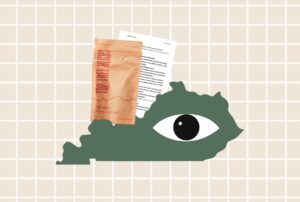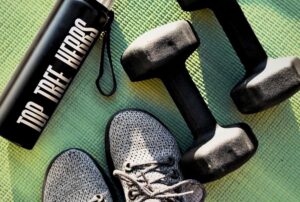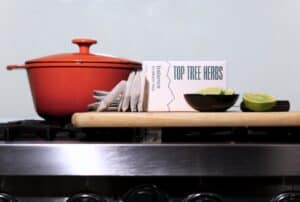In a world where the buzz of coffee reigns supreme, many of us are on the lookout for alternatives that keep us energized and focused without the side effects of caffeine. Whether it’s due to caffeine sensitivity, the desire for a late-night soothing cup that won’t ruin your sleep schedule, or simply a health-conscious choice, caffeine free tea offers a world of benefits.
The caffeine-free tea category is pretty expansive, however. So what are the best caffeine free teas to help you stay motivated and focused? What teas don’t have caffeine but can wake you up in the morning? Which caffeine free tea can you count on to support you through tough days?
- When to take a break from caffeine
- Best caffeine-free teas
- Best brands and blends to try
- Avoiding misleading marketing claims
Well, if you’re looking for a warm pick-me-up but are trying to avoid caffeine, you’re in the right place. We’re here to help you find the best energizing caffeine free teas.
When Should You Take a Break from Caffeine?
Caffeine, or 1,3,7-trimethylxanthine, is immensely popular. Some studies have estimated that 85% of Americans consume at least one caffeinated beverage a day.
Globally, Camellia sinensis tea is the most-consumed beverage behind water, and coffee is next on the list. If caffeine were to suddenly drop out of existence, the impact would be nothing short of a total shutdown of societal function.
So if everyone is doing it, why would you be looking for a tea without any of the good stuff? Why look for the best tea for focus without caffeine? Well, there are a number of possible issues associated with prolonged and increased use of caffeine.
Related: Does herbal tea contain caffeine? How does it compare to true tea or decaffeinated tea?
Caffeine’s Negative Effects and Diminishing Benefits
Caffeine’s less-desirable effects can range from anxiety and insomnia to sweaty hands. It can even cause serious health issues like heart palpitations or death if you consume a large enough amount.
Caffeine can also increase cortisol levels. Too much cortisol is said to lead to a feeling of burnout or a drop in focus and motivation. Unsurprisingly, most people want to avoid these downsides of caffeine.
On top of that, there’s another reason many people might want to break from caffeine: it’s just not working like it used to. Long gone are the days of inspirational energy and a heightened mood. Now, it seems like your coffee and energy drinks only serves to prevent your withdrawal from caffeine.
If it’s not helping you wake up anymore, it’s only serving to stave off the headache and grogginess. With this realization, caffeine fanatics hit their wits’ end.
It’s time to ask the serious questions: What’s a good drink to support energy and focus that can replace coffee? What is the best caffeine free tea?
What are the Best Caffeine Free Teas?
So, what’s the best tea for focus and energy without caffeine? When it comes to finding a good caffeine alternative in the form of an herbal tea, you’ve got a few options—some better than others.
Sometimes you have to brew a particular tea a few times to narrow down the right serving size and flavor. Keep an open mind, and you’ll find a caffeine-free tea you love.
Each works through different pharmacokinetic mechanisms and has a very distinct flavor. If you try one and don’t like it, don’t go running straight back to coffee!
Sometimes you have to brew a particular tea a few times to narrow down the right serving size and flavor. Keep an open mind, and you’ll find a caffeine-free tea you love.
Related: How Adaptogenic Teas Can Support Your Wellbeing
We want to remind you to always consult with a healthcare provider before adding any new herbs to your wellness routine.
Generally, herbal teas are mild and provide benefits at safe levels, but some people may experience adverse reactions due to interactions with medication or health conditions. Just like coffee and caffeine, the active compounds in some caffeine-free teas may not be safe for women who are pregnant or nursing.
With that said, let’s jump into our shortlist of herbs and blends that make the best caffeine free tea.
1. Rooibos Tea
Rooibos, scientifically known as Aspalathus linearis, is a shrub native to South Africa. People process rooibos into tea using a few different methods. Both red rooibos (which is also called African red bush tea) and green rooibos have become increasingly popular beverages worldwide. Rooibos tea is distinguished by its red color and earthy vanilla taste.
Preparation and Characteristics
Rooibos is prepared similarly to other teas. To make red rooibos, the leaves are harvested, crushed, and then oxidized, which gives the tea its distinctive red color. You brew the tea with hot water to create a rich, reddish-brown infusion.
Rooibos can be enjoyed plain or with added flavors. For coffee-lovers who want a caffeine free tea that still has a rich and roasted flavor, try a cocoa and rooibos tea blend!
Health Benefits of Rooibos Tea
Rooibos tea is loaded with antioxidants, including aspalathin and nothofagin. Although rooibos does not contain caffeine, many people report a subtle increase in energy levels after consuming the tea. Unlike coffee, you can consume rooibos tea later in the day without impacting your sleep.
2. Kratom Tea
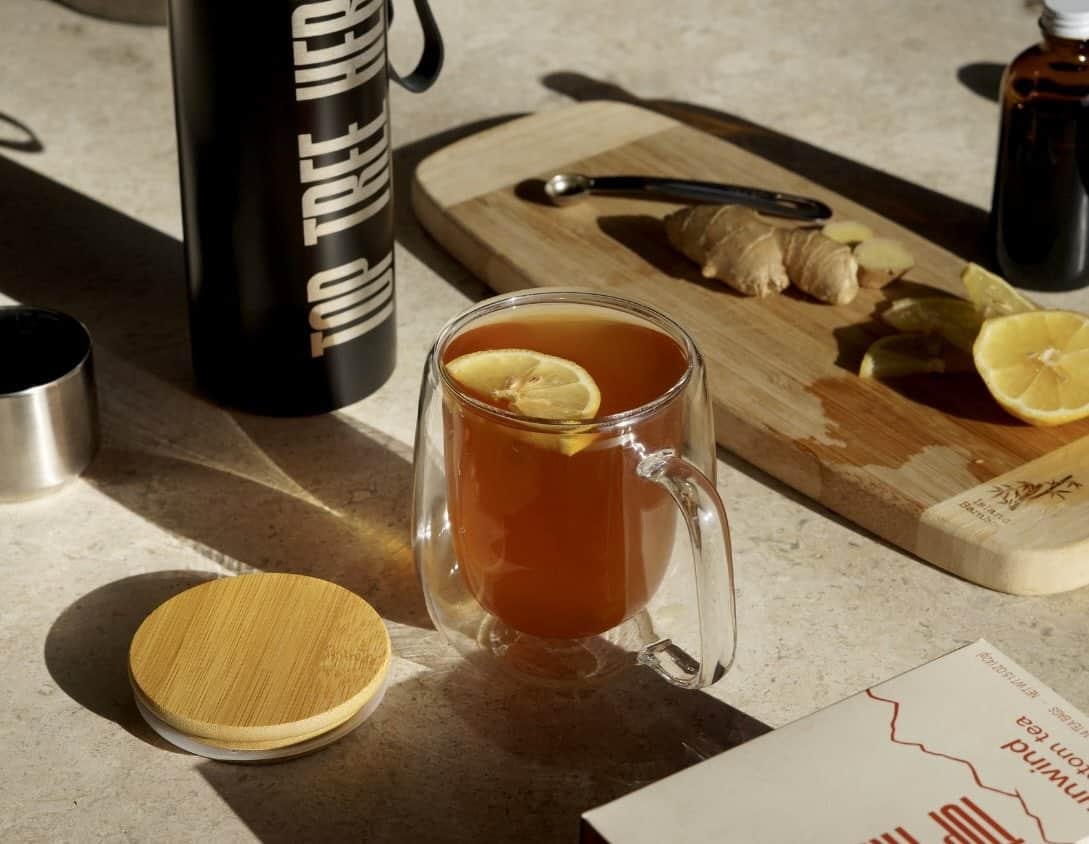
Kratom tea is a great alternative to coffee, and has noticeable effects unlike many other herbal teas. This energizing tea has exploded in popularity recently.
The kratom tree, Mitragyna speciosa, is in the same family as plants in the Coffea genus—coffee plants! Kratom produces some energizing alkaloids but, luckily, didn’t get the caffeine genes.
In smaller serving sizes, kratom is a motivation-boosting tea without caffeine. Bookworms and bodybuilders alike enjoy it for energy and focus. In fact, people very commonly use kratom tea before working out or doing physical labor!
Unlike caffeinated drinks, kratom tea may also promote relaxation and restore a sense of comfort and connection with your body.
Best of all, there are hundreds of delicious recipes you can make. For the coffee lovers, we recommend this kratom hot chocolate recipe or a creamy kratom chai latte. For fans of bright and citrusy teas, you can make hot or iced tea with add-ins like ginger, orange, lemon, and mint.
Best Energizing Kratom Tea
Researchers believe that the alkaloids in kratom are responsible for the majority of the effects felt from consuming kratom tea. Like many natural products, such as coffee or black tea, kratom alkaloids can vary based on environmental conditions and processing methods.
One plant, Camellia sinensis, is used to create black tea, green tea, and white tea. Similarly, Mitragyna speciosa leaves are used to make a variety of different kratom tea types. The most common are green vein, white vein, and red vein kratom tea.
The harvesting conditions and leaf-drying methods can affect the overall alkaloid profiles of a kratom tea batch. This is how we get different “vein colors” with different effects.
Related: Fact or myth? Learn the science behind strains of kratom.
Well, when it comes to the three vein colors, white vein kratom tea is considered the best type of kratom for energy and focus. It’s naturally free from caffeine. Even our cacao white vein blend, Cacao Uplift, is a caffeine free tea.
That being said, you shouldn’t focus on the vein color alone when making kratom tea to stay energized. Serving size is one of the most important factors that you should be aware of.
In fact, a smaller serving size will give you a better boost than a larger serving size of kratom tea. For most people, a small serving is one or two 3-gram tea bags steeped in boiling water for 15 minutes.
If you drink too little and don’t notice any effects, you can just drink a small amount more and figure out which kratom tea serving size is best to feel motivated. Fortunately, if you buy kratom tea bags, it’s pretty simple to get your serving size correct.
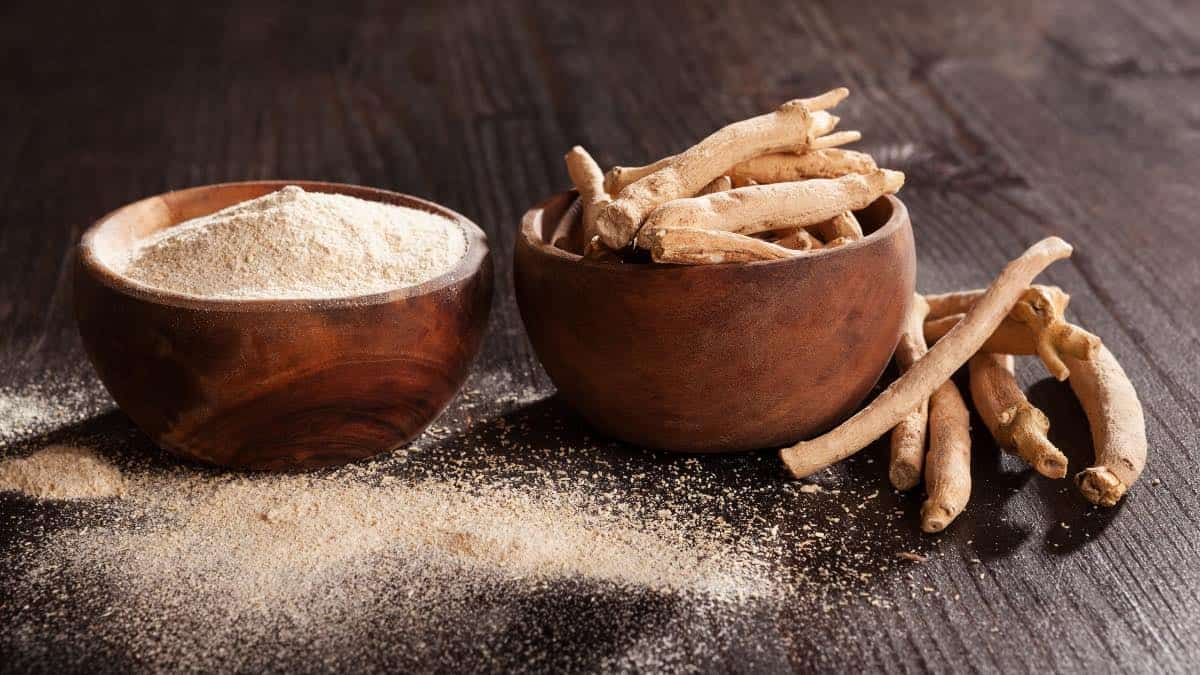
3. Ashwagandha Tea
In the realm of herbal remedies, ashwagandha (Withania somnifera) stands out as a revered adaptogen. Ashwagandha originates from Ayurveda, the ancient Indian system of medicine.
Ashwagandha, often referred to as Indian ginseng, is a small shrub with yellow flowers, native to India and North Africa. The roots have been used for centuries to combat stress, improve concentration, and increase energy levels.
Ashwagandha has repeatedly been the subject of small scientific studies. Without any large scale clinical trials, we have to rely on results of these smaller studies to give us clues about the potential of this root. The research so far is very promising. It shows that no singular compound is responsible for the reported effects of ashwagandha.
Further, studies demonstrating the effects of ashwagandha mainly focus on root extracts, but these benefits may still be present in Ashwagandha tea or root decoction.
How Does Ashwagandha Tea Provide Energy?
Normally ashwagandha is seen as a calming herb. Ashwagandha may help regulate sleep, which in turn enhances daytime energy.
Ashwagandha is classified as an adaptogen, meaning it helps the body manage stress. Researchers believe it can reduce or balance levels of the “stress hormone” cortisol—a hormone that can be negatively affected by caffeine. By reducing stress and anxiety, it can indirectly contribute to increased energy levels.
Some studies suggest that ashwagandha can improve physical performance. This includes increased strength and stamina, which are crucial for overall energy levels. Additionally, it appears to aid muscle recovery post-exercise, making it popular among athletes.
Preparation of Ashwagandha Tea
Typically, you prepare ashwagandha tea by steeping the powdered root in hot water. This is one of the fastest methods to extract the beneficial compounds from the roots, though the end product may be grittier.
Alternatively, you can create a root decoction. To do so, you simmer pieces of the roots—not powder—in water for a longer period of time. This makes it possible to extract the active compounds in the roots.
No matter how you choose to make your ashwagandha tea, it will have an earthy and slightly bitter taste. You can easily enhance it with a bit of sweetener, or add in other herbs for flavor.
Safety and Serving Size
The appropriate serving size can vary based on individual needs. A common recommendation is about 300-500 mg of the extract, or a teaspoon of the root powder.
While research is ongoing, the anecdotal and historical use of ashwagandha, coupled with emerging scientific evidence, support its role as an effective energy-enhancer.
4. Rhodiola Tea
Rhodiola rosea, often referred to as the ‘golden root’, is an herb renowned in traditional medicine systems of Europe and Asia.
Rhodiola thrives in cold, mountainous regions. It has been traditionally used to increase physical endurance, longevity, and resistance to altitude sickness.
As an adaptogen, Rhodiola helps the body cope with stress and reduces mental fatigue. It’s known for its stimulating properties, making it a popular choice among those seeking a natural energy boost. Rhodiola also contains potent antioxidants that help reduce oxidative stress in the body.
On top of that, rhodiola tea is known to improve cognitive functions, including memory, attention, and concentration. This has made it a favorite amongst people looking to enhance focus while working studying, in addition to athletes and physically active individuals.
Preparation and Characteristics
Rhodiola is typically prepared by steeping the dried roots in hot water. The tea has a slightly bitter, rose-like flavor, which can be tempered with agave or lemon. Due to its stimulating effects, it’s best consumed in the morning or early afternoon to avoid potential sleep disturbances.
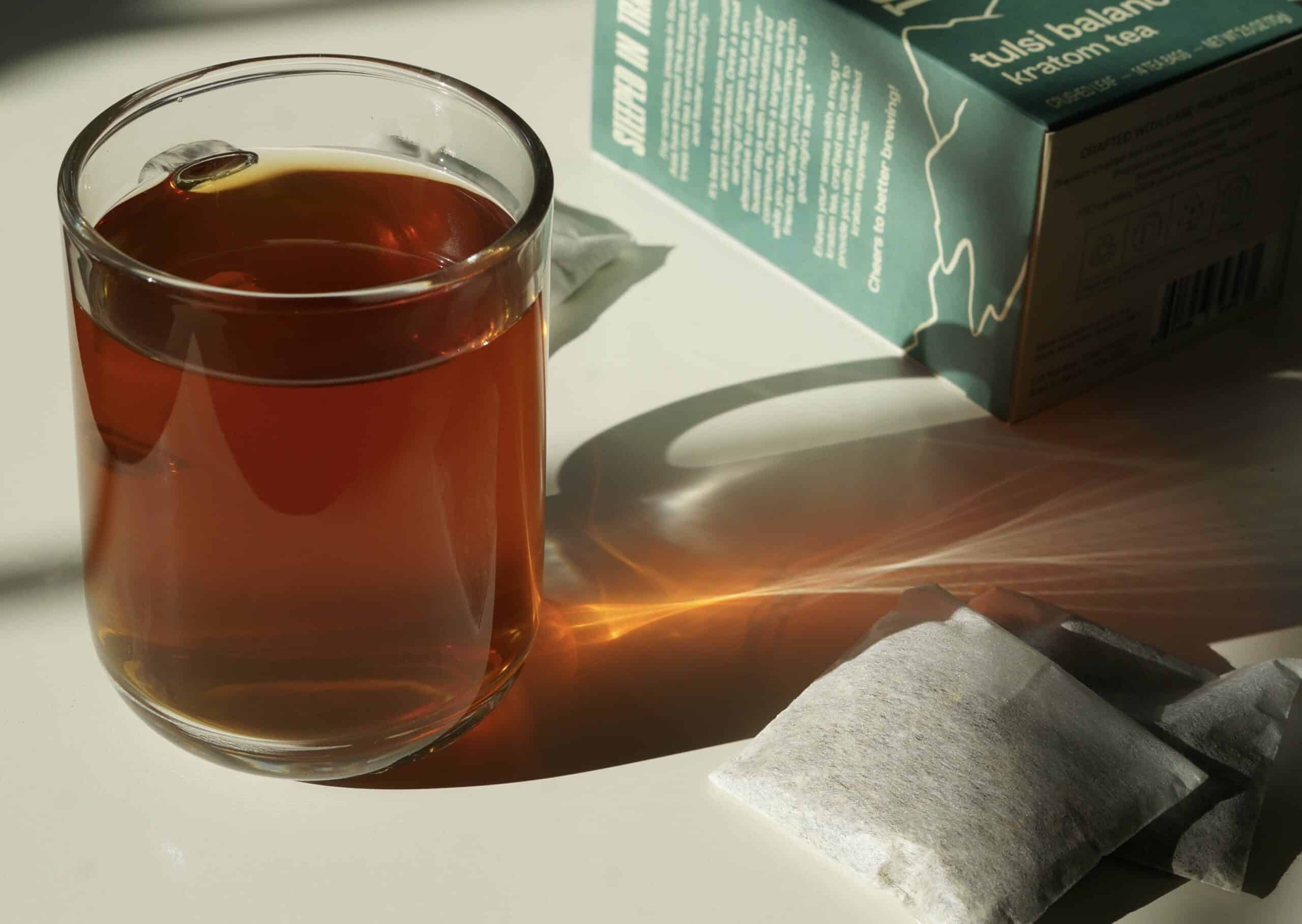
5. Tulsi Tea
Tulsi, also known as Holy Basil (Ocimum sanctum), is both a global culinary staple and an Ayurvedic symbol of wellness and spiritual sanctity. It is known for its aromatic, slightly spicy flavor and a myriad of health benefits.
Tulsi is an adaptogen, meaning it helps the body adapt to stress and promotes mental balance. While Tulsi tea is caffeine-free, its stress-reducing properties can lead to improved energy and mental clarity.
Preparation and Characteristics
You can easily steep tulsi leaves in hot water to prepare a revitalizing caffeine-free infusion. You can consume tulsi tea alone or blended with other herbs like rooibos. Tulsi tea has a unique flavor profile. It has a blend of minty, peppery, and clove-like notes.
6. Adaptogenic Mushroom Tea Blends
Energizing mushroom tea blends are gaining popularity for their unique health benefits and caffeine free energy-boosting properties.
While mushrooms are not herbs, they are often still lumped together with herbs in the context of herbal teas and natural remedies. Yet the active compounds found in mushrooms, such as polysaccharides, triterpenoids, and beta-glucans, differ significantly from those found in plants.
Oftentimes, you’ll find mushrooms blended with other herbs to enhance both flavor and efficacy. Here are some commonly used mushrooms in caffeine free tea blends:
- Cordyceps: Known for their energy-boosting properties, cordyceps are often used in teas to increase stamina and endurance. They are believed to help improve the body’s use of oxygen and enhance blood flow, making them a favorite among athletes and those seeking a natural energy boost.
- Lion’s Mane: While primarily known for its cognitive benefits, including improved concentration and memory, Lion’s Mane can also have an energizing effect due to its potential to reduce fatigue and improve mental clarity.
- Chaga: Chaga mushrooms are rich in antioxidants and are often used in tea blends for their immune-boosting properties. They can also contribute to increased energy levels.
You can find mushroom tea and mushroom coffee alternatives at many health food stores, as well as online. Depending upon where you live, you could even forage for the energizing mushrooms yourself!
Be cautious when foraging, and only consume mushrooms when you’re certain of the species and proper preparation methods.
7. Decaffeinated Coffee
The final item on our list isn’t an herbal tea. Nonetheless, it is an important option to consider.
Keep in mind that the decaffeination process may not remove 100% of caffeine from coffee beans. That means decaffeinated coffee not a truly caffeine free drink. If you are very sensitive to caffeine, you might prefer a different option on this list.
Decaffeinated coffee can still be somewhat energizing, though not to the same extent as regular coffee. The energizing effect of decaf coffee is generally regarded as more psychological and less physiological compared to regular coffee.
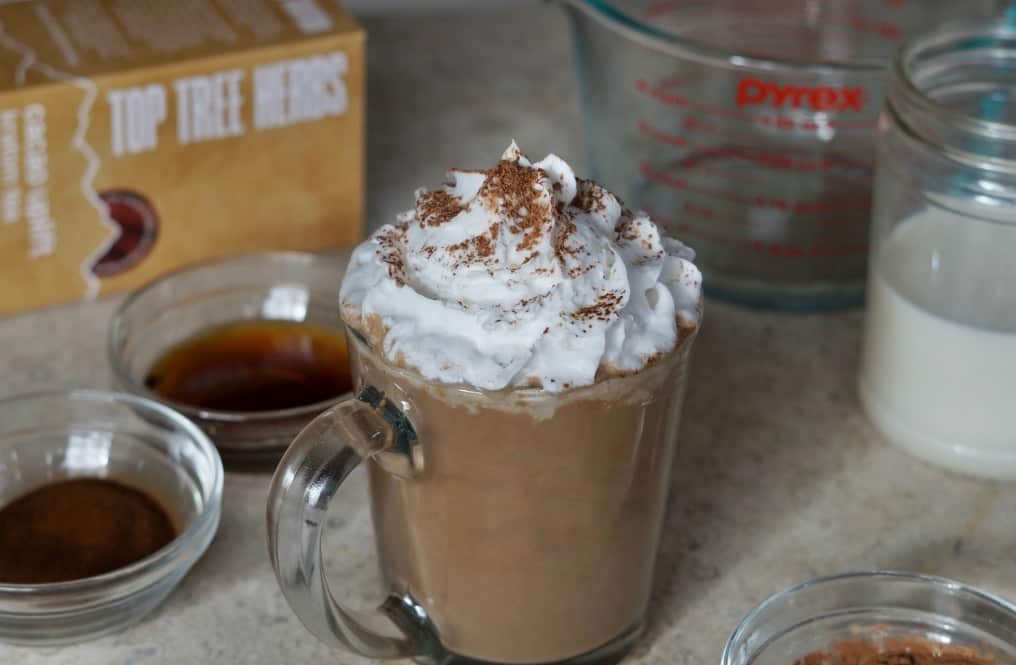
How can Caffeine-Free Coffee be Energizing?
There are a few reasons why decaf coffee might feel energizing. First, decaf coffee typically contains about 2 to 5 milligrams of caffeine per cup. While this is much less than regular coffee, it might still provide a very mild stimulant effect for those particularly sensitive to caffeine.
Second, the act of drinking coffee, regardless of its caffeine content, can be energizing due to psychological associations. The routine of having a warm beverage, especially one typically associated with alertness and energy, can create a placebo effect that makes you feel more awake and alert.
Third, coffee contains other compounds besides caffeine that can have various effects on the body. For example, certain acids and antioxidants in coffee might have a mild energizing effect or contribute positively to mood and mental alertness.
Lastly, any beverage that hydrates you can also provide a sense of energy. Dehydration often leads to fatigue, so drinking fluids, including decaf coffee, might help alleviate tiredness.
Don’t want to drink caffeine but really miss the flavor of coffee? Try combining decaffeinated coffee with one of the caffeine free teas recommended above, either side by side or in a blend.
The warmth of the decaf coffee can be soothing and revitalizing, providing a psychological boost that might be perceived as increased energy. Plus, coffee-drinking is often a social activity. Engaging in social interactions or taking a break with a cup of decaf can be mentally refreshing and rejuvenating.
On that note, if you’re looking for a cafe that serves energizing beverages aside from just coffee and black tea, try going to a local kava bar.
Best Caffeine Free Tea Brands & Blends
Navigating the immense ocean of caffeine free tea options can be overwhelming. Here are a few of the best brands and blends that we recommend for caffeine free motivation:
- Lion’s Mane Rhodiola adaptogenic herbal coffee blend by Teeccino
- Cacao Uplift white vein kratom tea by Top Tree Herbs
- Chaga Ashwagandha herbal coffee blend by Teecchino
- Ashwagandha tea by From Great Origins
- Tulsi Balance kratom tea with rooibos, peach, and mango by Top Tree Herbs
- Rooibos organic tea by Equal Exchange
Which Caffeine Free Teas are Not Good For Energy
As illustrated earlier, the benefits of caffeine free teas aren’t always straightforward. For instance, some teas don’t have a noticeable effect when you drink them. Yet, they can indirectly assist energy levels by improving your sleep.
On the other hand, there are also teas that likely don’t directly or indirectly benefit energy levels, despite widespread claims that they do.
One example is ginseng, which includes numerous species in the Panax genus. Ginseng is often touted for having energizing effects. This perception is enhanced by marketing for products like Red Bull, which combines ginseng with large amounts of caffeine.
However, the amount of active compounds found in ginseng tea itself is probably not sufficient to provide any energizing effects. To get such benefits, you’d have to consume a concentrated extract instead.
Dr. Harris Lieberman reviewed the purported energizing benefits of numerous caffeinated and caffeine-free teas in 2001. He explained that, “although ginseng is widely touted in the West for its beneficial effects on perceived energy, there is very little convincing scientific evidence to support such claims.”
Avoiding Exaggerated Claims While Learning from Research, Tradition, and Experience
That’s not to say that ginseng and other culturally important herbs have no benefits whatsoever.
It’s just a reminder to proceed with caution into the world of caffeine free energy alternatives, where competition may drive companies to exaggerate benefits and effects of their products.
Plus, clinical research into botanicals is still emerging. The anecdotal and scientific benefits of caffeine free tea that we currently know about may only be a small subset of the entire range. Further, everyone has a unique physiology and unique life experiences. Such individual differences can mediate the effects you receive from various caffeine-free teas.
Caffeine Free Tea is Steeped in Possibilities
It’s clear that these botanical brews are more than just a simple alternative to your morning espresso. They are, in fact, a complex blend of chemistry, tradition, and taste—a liquid symphony where the notes are flavonoids and the rhythm is set by antioxidants.
The world of caffeine-free teas is vast and varied. Each blend offers a distinctive way to unlock doors to motivation and attention.
Whether it’s a jitter-free lift from a mug of kratom tea or mental clarity from a cup of rooibos, these alternatives remind us that energy doesn’t always have to come with a cost to our peace of mind.
Here’s to finding your perfect energizing tea. Cheers to better—and less caffeinated—brewing!
